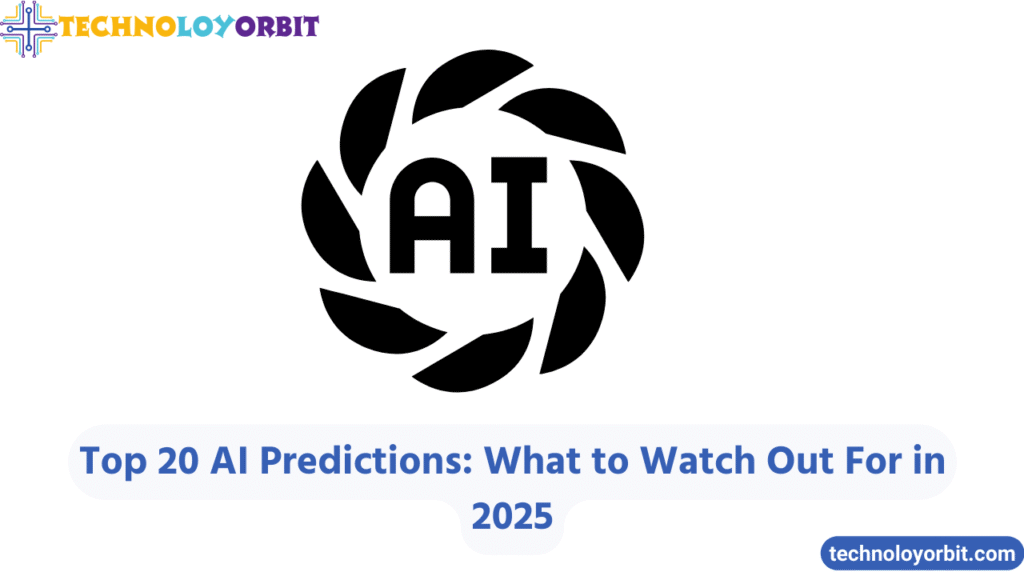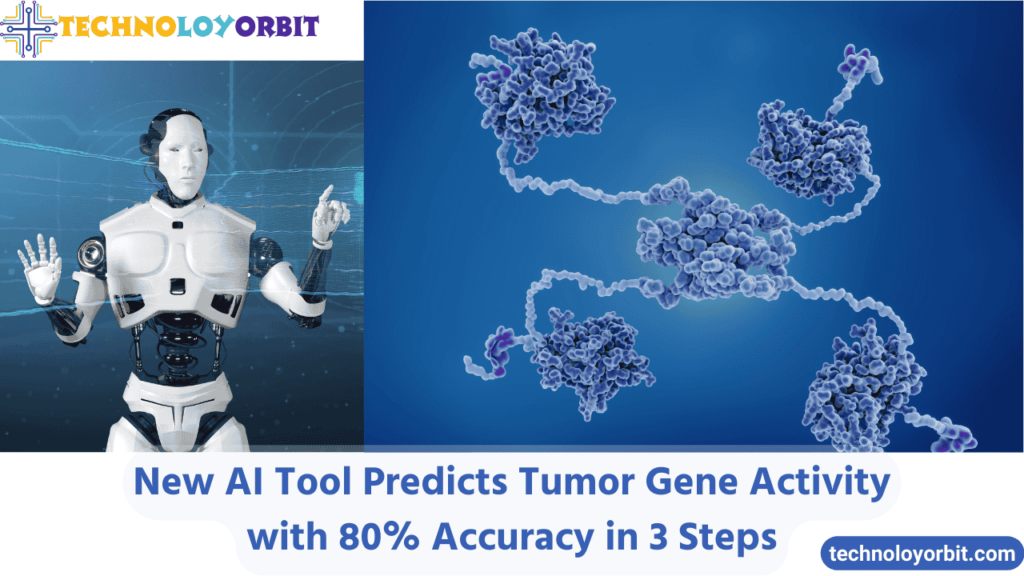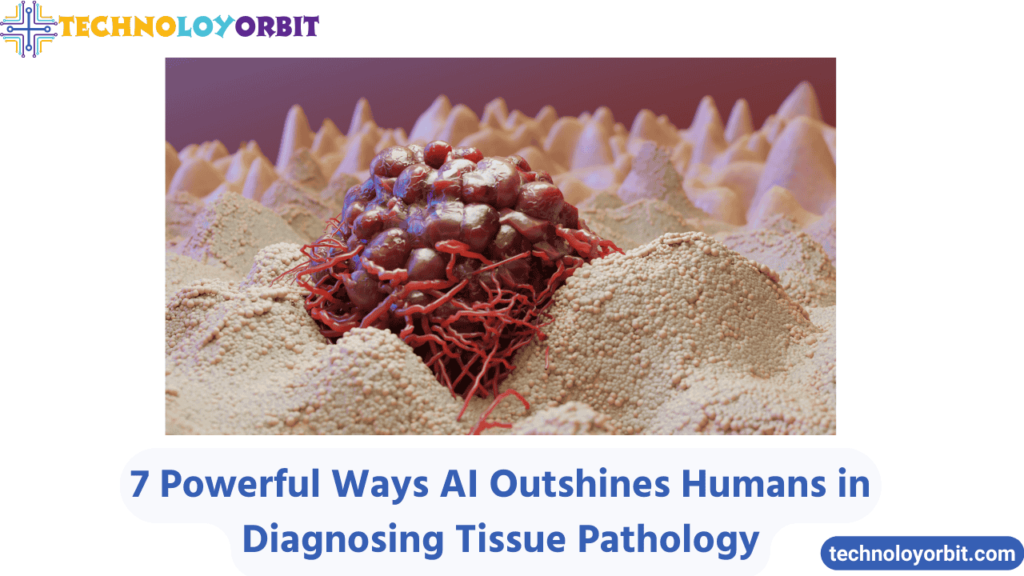The AI predictions for 2025 highlight advancements in diverse fields, including healthcare, autonomous vehicles, and smart cities, emphasizing both opportunities and challenges as AI continues to reshape industries worldwide.
Artificial Intelligence (AI) continues to shape industries, revolutionize technology, and transform daily life. As we approach 2025, the field is poised for even more groundbreaking advancements. These AI predictions for 2025 will help you stay ahead of the curve in understanding how AI might evolve and influence the future. Let’s dive into these predictions, exploring potential innovations, applications, and challenges.
1. AI’s Dominance in Healthcare

The healthcare sector is expected to experience unprecedented AI-driven advancements by 2025. AI will enable earlier disease detection, more accurate diagnoses, and personalized treatment plans. Tools like AI-powered imaging and robotic surgeries will become more widespread, making healthcare faster and more efficient. For example, AI algorithms analyzing medical images can detect anomalies with higher accuracy than humans.
However, challenges such as ethical concerns over patient data and potential job displacement for medical staff need addressing. Solutions include implementing robust data privacy laws and focusing on reskilling medical professionals to work alongside AI systems.
2. Autonomous Vehicles Go Mainstream
One of the most awaited AI predictions for 2025 is the expansion of autonomous vehicles. Companies like Tesla, Waymo, and GM are racing to perfect fully self-driving cars. AI technologies like computer vision, LIDAR, and predictive analytics will ensure safer and more reliable navigation.
By 2025, autonomous delivery vehicles and drones will also see significant adoption. Governments will need to create regulations to ensure safety and manage the ethical implications of self-driving technology.
3. AI in Creative Fields
Contrary to the belief that creativity is uniquely human, AI tools are becoming proficient at generating art, music, and even literature. By 2025, AI-driven platforms like DALL-E and ChatGPT will be standard in assisting professionals in creative industries.
For example, businesses will use AI-generated content for marketing campaigns, while artists will collaborate with AI to produce innovative works. Despite concerns over authenticity, collaboration between human creativity and AI innovation is likely to flourish.
4. AI Ethics Will Take Center Stage
As AI becomes more embedded in society, ethical considerations will become crucial. Issues like bias in AI systems, lack of transparency, and potential misuse will dominate discussions. AI governance frameworks and regulations will be necessary to ensure responsible usage.
Governments and organizations must invest in research to make AI systems fair and accountable. Tools like explainable AI (XAI) will gain traction, enabling stakeholders to understand and trust AI decisions.
5. Breakthroughs in Natural Language Processing (NLP)
NLP, a key area of AI, will reach new heights by 2025. Chatbots and virtual assistants will become indistinguishable from humans, making customer service more seamless. Advanced language models will also power real-time translation and content creation.
Applications such as voice-based interfaces in smart devices will enhance accessibility for people with disabilities, ensuring AI’s benefits reach a broader audience. However, mitigating risks like misinformation generated by AI remains vital.
6. AI in Education
AI is set to transform the education sector by 2025. Personalized learning platforms powered by AI will cater to individual learning styles and paces. Students will benefit from AI tutors that provide instant feedback and customized recommendations.
For instance, tools like adaptive learning software will help identify weak areas and suggest targeted exercises. To address challenges like unequal access, governments and institutions should focus on making AI-powered educational tools affordable and inclusive.
7. Revolutionizing Cybersecurity with AI
With the growing frequency of cyberattacks, AI-driven cybersecurity solutions will become indispensable by 2025. AI can identify and neutralize threats faster than traditional methods, making systems more secure.
AI-powered tools like anomaly detection and predictive analytics will allow organizations to proactively address vulnerabilities. Collaboration between AI systems and human analysts will ensure comprehensive security coverage.
8. AI in Smart Cities
Smart cities will rely heavily on AI to optimize infrastructure, reduce energy consumption, and improve quality of life. By 2025, AI-driven traffic management systems will significantly reduce congestion and pollution.
AI will also enhance public safety by analyzing data from surveillance cameras to predict and prevent crimes. However, concerns over privacy and surveillance require transparent policies to ensure ethical implementation.
9. AI-Powered Climate Solutions
Climate change mitigation is a pressing challenge, and AI technologies are set to play a vital role. By 2025, AI will enhance weather forecasting, optimize renewable energy systems, and monitor deforestation in real time.
AI-driven models will also predict environmental impacts more accurately, helping policymakers make informed decisions. To maximize these benefits, collaboration between AI researchers and environmentalists is essential.
10. Growth of AI in E-commerce

E-commerce platforms will heavily leverage AI by 2025 to provide personalized shopping experiences. From AI-driven recommendations to virtual try-ons, the customer journey will become more interactive and efficient.
Additionally, AI chatbots will handle customer queries, while inventory management systems will ensure timely restocking. Addressing concerns like data privacy will be critical for maintaining consumer trust.
11. Rise of Explainable AI (XAI)
Explainable AI will address the “black box” nature of traditional AI systems. By 2025, XAI will enable stakeholders to understand how AI models arrive at decisions. This transparency will be crucial for sensitive applications like healthcare and finance.
Organizations adopting XAI will see increased trust and adoption of their AI solutions. Investing in user-friendly tools to interpret AI decisions will be key.
12. AI in Manufacturing and Automation
AI will continue to transform manufacturing through smart factories and advanced robotics. By 2025, predictive maintenance systems will reduce downtime, while AI-powered robots will enhance efficiency and accuracy.
Automation will also extend to supply chains, improving logistics and reducing costs. However, companies must address concerns over job losses by reskilling workers for AI-centric roles.
13. Enhanced AI Integration in Financial Services
The financial sector will increasingly rely on AI for fraud detection, credit scoring, and personalized banking. AI algorithms will analyze large datasets to identify patterns and provide insights for better decision-making.
By 2025, AI-driven robo-advisors will offer investment advice tailored to individual goals. Ensuring transparency in AI decisions will be vital to maintaining consumer trust.
14. AI in Space Exploration
AI’s role in space exploration will expand significantly by 2025. From analyzing data collected by satellites to navigating unmanned missions, AI technologies will accelerate advancements in this field.
AI systems will also enable real-time decision-making in space, reducing reliance on Earth-based control. Collaboration between space agencies and AI researchers will unlock new possibilities.
15. AI-Driven Gaming Experiences
The gaming industry will witness revolutionary changes with AI technologies enhancing player experiences. By 2025, AI will create adaptive storylines and intelligent NPCs, making games more immersive.
Additionally, AI-powered analytics will help developers understand player behavior and optimize game designs. Ensuring ethical use of AI in gaming, such as avoiding manipulative practices, will remain essential.
16. AI-Powered Wearables
Wearable devices will become more intelligent with AI integration by 2025. From health monitoring to personal productivity, these devices will provide actionable insights based on real-time data.
AI-powered wearables will also enhance user experience with predictive capabilities. Addressing concerns like data security will ensure widespread adoption.
17. Advancements in AI Hardware
By 2025, AI hardware will see significant improvements, enabling faster and more energy-efficient computations. Quantum computing and specialized chips like TPUs will power next-generation AI applications.
These advancements will make AI more accessible and affordable, driving innovation across industries. Investing in sustainable manufacturing practices for AI hardware will be crucial.
18. AI in Agriculture
Agriculture will benefit from AI-driven tools like precision farming and automated machinery by 2025. AI models will optimize crop yields, monitor soil health, and predict weather patterns.
Farmers will also use AI-powered drones for surveillance and pesticide application. Ensuring equitable access to AI technologies will promote sustainable farming globally.
19. AI-Powered Personal Assistants
By 2025, personal assistants like Alexa and Google Assistant will become even more sophisticated, offering proactive suggestions based on user behavior. AI-driven assistants will streamline tasks, improving productivity and convenience.
Ensuring data privacy and transparency in AI recommendations will foster user trust. Collaborations between AI developers and regulators will address these concerns effectively.
20. AI’s Impact on the Job Market

Finally, one of the most debated document-related predictions is the impact of AI on the workforce. While AI will automate repetitive tasks, it will also create new opportunities in fields like AI development, data analysis, and robotics.
Governments and organizations must prioritize workforce reskilling to prepare for these changes. Encouraging collaboration between humans and AI will ensure a balanced transition.
FAQs About AI Predictions for 2025
- What industries will AI impact the most in 2025? AI is expected to revolutionize industries like healthcare, education, finance, and manufacturing, among others.
- What is explainable AI (XAI)? Explainable AI refers to systems designed to make AI decisions transparent and understandable to users.
- Will AI completely replace jobs? While AI may automate certain roles, it will also create new opportunities requiring advanced skills.
- How will AI help combat climate change? AI will enhance climate modeling, optimize renewable energy, and monitor environmental changes effectively.
- What challenges does AI face in 2025? Ethical concerns, data privacy issues, and bias in AI systems remain critical challenges to address.
This article provides a detailed overview of the top 20 AI predictions for 2025, ensuring a comprehensive understanding of this transformative technology. Stay informed, as the future of AI is closer than ever. Please follow out blog Technoloyorbit.



